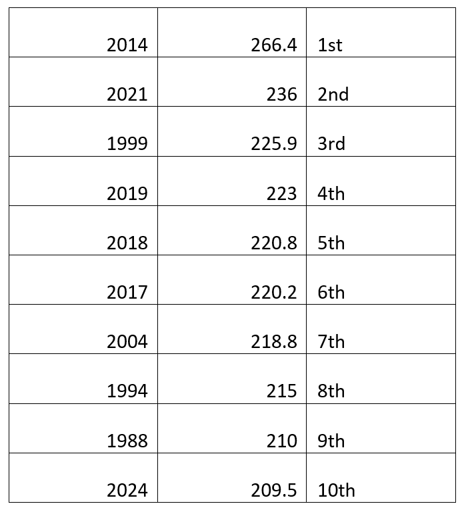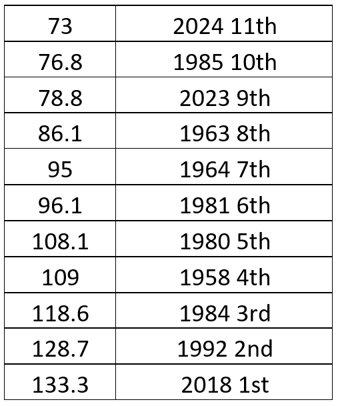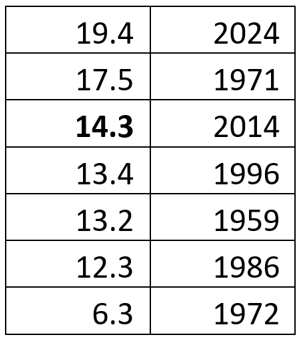December 2024 was the joint fifth warmest December in 70 years
Blog by Joyce Reid, Media officer
Last month was the warmest December since 2016 and the joint 5th warmest December (along with December 1974) since the Hutton’s records began in 1954. The average air temperature was 5.8C, 2
above the long-term average (1991 – 2020) of 3.8
C. The mercury hit a high of 13.4
C twice last month, on the 1st and 17th December.
We recorded a total of 1504.9 hours of sunshine, the 21st highest on our records. It was also the driest final month of the year since 2006, with only 637mm of rain.
The unseasonably warm December brought to an end the third warmest year on record, with an average air temperature of 9.7C. That’s a mere 0.2
less than 2022, the hottest year so far.
The average warmest daily minimum temperature of 6.4C was the highest since 2016.
2024 was the warmest year on record globally and is the eleventh year in succession that has equalled or exceeded 1.0°C above the pre-industrial average period (1850 – 1900).
All ten of the top warmest years have occurred since the year 2000, with five in the most recent decade, 2015 – 2024.


Pictured: Johan Rockström is Director of the Potsdam Institute for Climate Impact Research and Professor in Earth System Science at the University of Potsdam
Looking back at 2024 at our Invergowrie site
January was the 15th sunniest and the 15th warmest held jointly with 1993, with slightly below average rainfall for the time of year.
February was the 8th sunniest February since our records began. The seven sunnier Februarys are shown in the table below.
February was the 2nd warmest February since our records began with a daily air mean of 6.2C. The warmest February was in 1998 with a daily air mean of 8.2
C.
Winter 2024, that’s December 2023 – February 2024, was the 10th sunniest winter since our records began, with 209.5 hours of sun. The 10 sunnier winters are shown in the table below.
It was also the second warmest winter on our records with a winter daily air mean of 5.3 ºC, beaten only by 1998 which had a daily air mean of 5.8 ºC.
Additional winter data shows that December 2023 was the second wettest December we have ever recorded (the wettest December was in 1977 where 215.6mm of rain fell), the 17th dullest December (held jointly with 1995 and 1982) but also the eighth warmest December on our records.
The seven warmer Decembers are in the table below.



Moving on to spring, March 2024 was the 11th wettest March since our records began. The ten wetter March months are shown in the table below.
April was the sixth wettest April since our records began. The five wetter April months are shown in this table.
It was the 17th joint warmest April (with 1959) on our records with a daily air mean slightly above the 30-year long-term average. Sun hours were just below the long-term average.
May was the 17th wettest May since our records began in 1954, the 16th dullest, but the warmest May since our records began. It broke the 2017 previous daily air mean record temperature of 12.3ºC.


218.5mm of rain fell during the spring months of March, April and May, making spring 2024 the 3rd wettest Spring we have ever recorded.
1969 with 248.4mm.
1998 with 241.3mm
1969 with 248.4mm
This was the warmest spring with a daily air mean of 9.7ºC, again breaking the 2017 record which was 9.3ºC. It was the 15th dullest spring with only 416 hours of sunshine recorded.
The temperature in June was below the long-term daily air average which placed this as the 35th coldest June we have on record since 1954 and the coldest recorded since 2019.
Below average rainfall and sun hours positioned June into 25th driest and 26th dullest recorded, with the least sun since 2020.
July saw below average rainfall placing it as the 16th driest July we have had. The daily air mean was just below average as was the total of sun hours.
August also showed a below average rainfall reading. The daily air temperature was about average, but it was the coldest August since 2020. However, it was the 7th sunniest August. The 6th sunnier years are show in this table.



The total summer rainfall was 129 mm which placed summer 2024 as the 19th driest. It was the coldest summer since 2015 though the hours of sunshine were about average at 354.1 hours.
September was the seventh driest September since 1954, the 16th sunniest and 16th coldest with a below average daily air mean.
The seven drier Septembers are shown in the table above.
We had a warm, dry and sunny October. Records show it was the 12th warmest; rainfall was below average (the lowest since 2018 when only 49.1 mm of rain fell) and sun hours ranked this as the ninth sunniest October on our records and the sunniest since 2008, when 120.9 hours of sun were recorded.
November was the eighth sunniest November since 1954. The daily air mean temperature for the month was just 0.1ºC below the 30 year long-term average. The monthly rainfall total was 43 mm, making it the 24th driest November, the same as November 2020.
Autumn 2024 had a sun hours total of 354.1 hours, which ranks it as the second sunniest autumn since our records began. It was beaten only by 1986 which had 374 hours of sun.
The daily air mean temperature of 9.3ºC was just above our average, though it was the coldest autumn since 2019, which was 8.4ºC. The rainfall total of 125.5 mm made this the 14th driest autumn.

Disclaimer: The views expressed in this blog post are the views of the author, and not an official position of the institute or funder.
